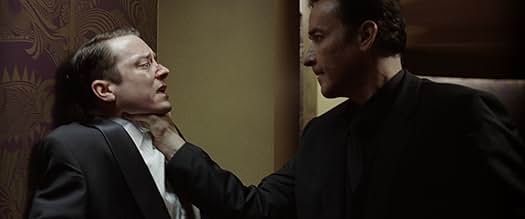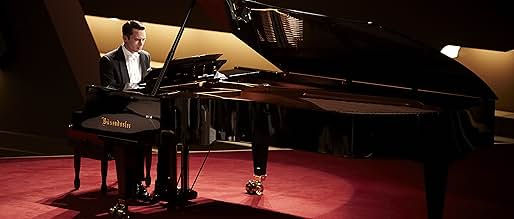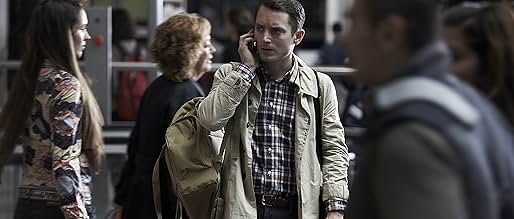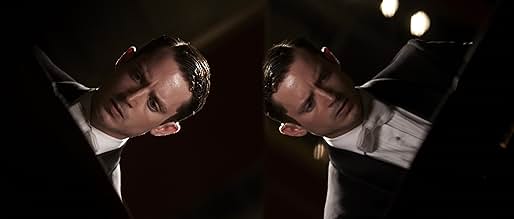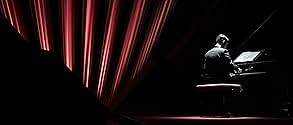IMDb-BEWERTUNG
5,9/10
19.883
IHRE BEWERTUNG
Füge eine Handlung in deiner Sprache hinzuA pianist with stage fright endures a performance under the eyes of a mysterious sniper, who will shoot and kill him if a wrong note is played.A pianist with stage fright endures a performance under the eyes of a mysterious sniper, who will shoot and kill him if a wrong note is played.A pianist with stage fright endures a performance under the eyes of a mysterious sniper, who will shoot and kill him if a wrong note is played.
- Auszeichnungen
- 5 Gewinne & 12 Nominierungen insgesamt
Beth Rollan
- Emma's Publicist
- (as a different name)
Richard Newby
- Executive
- (as Richard A. Newby)
Eric Goode
- Tom's Chauffeur
- (as Eric L. Goode)
Handlung
WUSSTEST DU SCHON:
- WissenswertesWood had worked with a teacher three weeks prior to going to Barcelona and found it stressful having to play the piano and speak at the same time saying, "It was incredibly technical [...] lots of moments where it was jumping from where I'd play, listen to a click, listen to music, have to be in the right place and the right time and hear dialogue and repeat dialogue".
- PatzerThe opening drive into Chicago begins southbound on Lake Shore Drive, then northbound on LaSalle (recognizable from the Batman films), then south on Wabash, then suddenly across the river, coming east on Washington, where the car finally stops at the Lyric Opera building. The interiors were shot elsewhere, so nothing looks like the actual hall.
- Crazy Credits"The Impossible Piece" plays as the end credits roll.
- VerbindungenFeatured in Dont' Miss a Note: The Making of Grand Piano (2014)
- SoundtracksTen Happy Fingers
Written by Dr. Seuss (as Theodore Geisel) and Friedrich Hollaender (as Frederick Hollander)
from Die 5000 Finger des Dr. T (1953) (uncredited)
Used by permission of Shapiro Bernstein Spain Mood Music Division
Courtesy of Columbia Pictures Industries,Inc.
Under license from Sony Pictures Music group
Ausgewählte Rezension
The plot in a sentence: a piano player has to play an 'impossible' piece perfectly or a bunch of people are gonna get whacked.
Now put that in your pocket and forget about it. I'm serious; if I hear one more person whining about the silly plot, I'm going to strangle someone with a low A string.
To make a point, let me throw a different plot-in-a-sentence at you: two strangers agree that they'll each commit murder for the other guy. I'm sure the silly-o-meter is lighting up, but cinephiles will recognize that plot from the classic Hitchcock masterpiece "Strangers on a Train". Hitchcock himself joked how insignificant a plot can be, introducing the concept "mcguffin", something that doesn't necessarily exist but is the motivation behind all the characters' actions. Like a box that everyone's killing each other over.
Why am I harping on Hitchcock? Because "Grand Piano" is perhaps the most loving tribute to Hitchcock that I've seen in my life. This means it's a throwback to the days when thrillers didn't need 29 plot twists, 54 explosions and 3.75 sex scenes to keep audiences awake. The audience's enjoyment came via the filmmaker's technique at telling a story. If you've ever been at a campfire when your spooky uncle Greg tells the story of "the claw" for the millionth time, to the delight of everyone present, you know what I mean.
So now let's talk about the storytelling presentation. I'm trying hard not to slip into film dweeb mode, because the technical points of this film are so stunning I could ramble for hours. Camera shots are carefully planned and orchestrated without distracting edits, meaning the camera often follows the action for several minutes before jumping to another angle. This is reminiscent of the famous Orson Welles "Touch of Evil" opening where the camera runs for nearly 4 minutes through city streets and dialogue closeups before a cut. Or how about Hitchcock's own "Rope", a 2 hour suspense thriller with only 10 camera cuts. Here in "Grand Piano" such scenes are prevalent, and the best one has to be the "Wayne" scene which follows the character Wayne frantically running through the theater for help while the action on the stage remains in the background. No cuts. If you're wondering how the eff they managed to do that, check out the movie.
Another piece of technical WOWery which you might not consider at first is that actor Elijah Wood is really playing the piano. In real life Elijah is a casual pianist who had to take a 3 week crash course in how to play the parts in his scenes, which often involve dialogue and physical action while staying right in time with the music he's playing with his hands. If you're one of those people who hates it when actors can't fake their instruments, rest assured this is very convincing. The director himself is a musician so you can bet he insisted on getting things right.
Which leads me to my overall feeling about this film. It is extremely precise. Not a scene is wasted, and every element is carefully orchestrated like, well, like an orchestra. Basically the entire film unfolds in real time, as Elijah ("Tom") tries to make it through 3 movements of a classical performance without too many bodies piling up. The movie's "soundtrack" is actually the music that's being played by the orchestra as the story unfolds. That itself is an original and very impressive feat, if you consider every scene has to be synchronized with the mood of the performance piece.
What makes "Grand Piano" extra fun is that the movie is not afraid to make fun of itself a bit. There's some nice humor and a sort of lighthearted cheekiness to it, even though there might be a few brutal killings going on. You could almost call this a "dark comedy" except that all the classic thrillers were dark comedies, so such a label would be redundant. It should be noted that Hitchcock himself had a wonderfully morbid sense of humor, and here the director upholds that spirit as well as the classic storytelling style. Anyone taking this plot too seriously should be hung from the rafters with rusty bolts and dangled over an orchestra pit playing fortissimo. Oh wait, that might've happened in the movie.
The acting. I won't dwell on Elijah Wood's amazing performance except to note that prior to this film I hadn't seen much of his work, and this movie made me an instant fan. John Cusack is... well, John Cusack. He's one of those actors like Christopher Walken who can sneeze and make it an Oscar winning performance. Although he doesn't get a ton of screen time here, his scenes were gripping. Another actor who deserves major kudos for bringing to life the terrifying/hilarious/lovable henchman character is Alex Winter (wait for it... wait for it... BILL from "Bill & Ted's Excellent Adventure"!) Omg he gets my vote for best bad guy sidekick since Jaws in James Bond Moonraker. And finally I have to tip my hat to "Wayne" (Allen Leech) and his barbie-doll manipulative girlfriend "Ashley" (Tamsin Egerton) who are a real treat to watch.
This movie has so many fun things going on, you forget how technically masterful it is. Like the old thrillers of the 40s & 50s, that's the way it's supposed to be. It's a funny irony that a Spanish production does the best justice to the golden age of Hollywood.
Now put that in your pocket and forget about it. I'm serious; if I hear one more person whining about the silly plot, I'm going to strangle someone with a low A string.
To make a point, let me throw a different plot-in-a-sentence at you: two strangers agree that they'll each commit murder for the other guy. I'm sure the silly-o-meter is lighting up, but cinephiles will recognize that plot from the classic Hitchcock masterpiece "Strangers on a Train". Hitchcock himself joked how insignificant a plot can be, introducing the concept "mcguffin", something that doesn't necessarily exist but is the motivation behind all the characters' actions. Like a box that everyone's killing each other over.
Why am I harping on Hitchcock? Because "Grand Piano" is perhaps the most loving tribute to Hitchcock that I've seen in my life. This means it's a throwback to the days when thrillers didn't need 29 plot twists, 54 explosions and 3.75 sex scenes to keep audiences awake. The audience's enjoyment came via the filmmaker's technique at telling a story. If you've ever been at a campfire when your spooky uncle Greg tells the story of "the claw" for the millionth time, to the delight of everyone present, you know what I mean.
So now let's talk about the storytelling presentation. I'm trying hard not to slip into film dweeb mode, because the technical points of this film are so stunning I could ramble for hours. Camera shots are carefully planned and orchestrated without distracting edits, meaning the camera often follows the action for several minutes before jumping to another angle. This is reminiscent of the famous Orson Welles "Touch of Evil" opening where the camera runs for nearly 4 minutes through city streets and dialogue closeups before a cut. Or how about Hitchcock's own "Rope", a 2 hour suspense thriller with only 10 camera cuts. Here in "Grand Piano" such scenes are prevalent, and the best one has to be the "Wayne" scene which follows the character Wayne frantically running through the theater for help while the action on the stage remains in the background. No cuts. If you're wondering how the eff they managed to do that, check out the movie.
Another piece of technical WOWery which you might not consider at first is that actor Elijah Wood is really playing the piano. In real life Elijah is a casual pianist who had to take a 3 week crash course in how to play the parts in his scenes, which often involve dialogue and physical action while staying right in time with the music he's playing with his hands. If you're one of those people who hates it when actors can't fake their instruments, rest assured this is very convincing. The director himself is a musician so you can bet he insisted on getting things right.
Which leads me to my overall feeling about this film. It is extremely precise. Not a scene is wasted, and every element is carefully orchestrated like, well, like an orchestra. Basically the entire film unfolds in real time, as Elijah ("Tom") tries to make it through 3 movements of a classical performance without too many bodies piling up. The movie's "soundtrack" is actually the music that's being played by the orchestra as the story unfolds. That itself is an original and very impressive feat, if you consider every scene has to be synchronized with the mood of the performance piece.
What makes "Grand Piano" extra fun is that the movie is not afraid to make fun of itself a bit. There's some nice humor and a sort of lighthearted cheekiness to it, even though there might be a few brutal killings going on. You could almost call this a "dark comedy" except that all the classic thrillers were dark comedies, so such a label would be redundant. It should be noted that Hitchcock himself had a wonderfully morbid sense of humor, and here the director upholds that spirit as well as the classic storytelling style. Anyone taking this plot too seriously should be hung from the rafters with rusty bolts and dangled over an orchestra pit playing fortissimo. Oh wait, that might've happened in the movie.
The acting. I won't dwell on Elijah Wood's amazing performance except to note that prior to this film I hadn't seen much of his work, and this movie made me an instant fan. John Cusack is... well, John Cusack. He's one of those actors like Christopher Walken who can sneeze and make it an Oscar winning performance. Although he doesn't get a ton of screen time here, his scenes were gripping. Another actor who deserves major kudos for bringing to life the terrifying/hilarious/lovable henchman character is Alex Winter (wait for it... wait for it... BILL from "Bill & Ted's Excellent Adventure"!) Omg he gets my vote for best bad guy sidekick since Jaws in James Bond Moonraker. And finally I have to tip my hat to "Wayne" (Allen Leech) and his barbie-doll manipulative girlfriend "Ashley" (Tamsin Egerton) who are a real treat to watch.
This movie has so many fun things going on, you forget how technically masterful it is. Like the old thrillers of the 40s & 50s, that's the way it's supposed to be. It's a funny irony that a Spanish production does the best justice to the golden age of Hollywood.
Top-Auswahl
Melde dich zum Bewerten an und greife auf die Watchlist für personalisierte Empfehlungen zu.
Details
- Erscheinungsdatum
- Herkunftsländer
- Offizielle Standorte
- Sprache
- Auch bekannt als
- Grand Piano
- Drehorte
- Produktionsfirmen
- Weitere beteiligte Unternehmen bei IMDbPro anzeigen
Box Office
- Bruttoertrag in den USA und Kanada
- 22.555 $
- Eröffnungswochenende in den USA und in Kanada
- 2.964 $
- 9. März 2014
- Weltweiter Bruttoertrag
- 1.618.085 $
- Laufzeit1 Stunde 30 Minuten
- Farbe
- Sound-Mix
- Seitenverhältnis
- 2.35 : 1
Zu dieser Seite beitragen
Bearbeitung vorschlagen oder fehlenden Inhalt hinzufügen

Oberste Lücke
By what name was Grand Piano - Symphonie der Angst (2013) officially released in India in English?
Antwort



